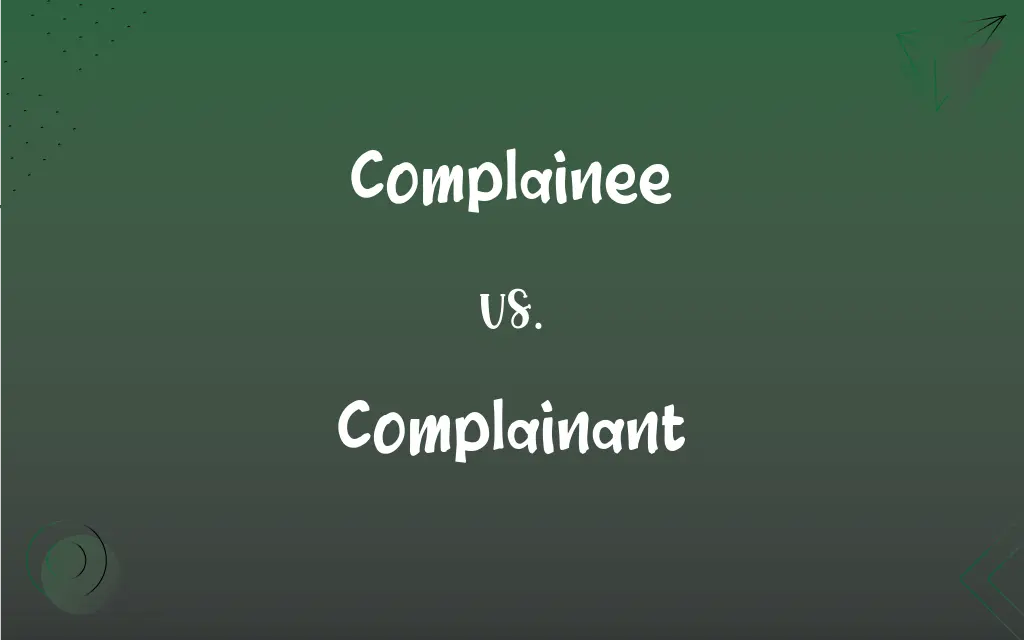Complainee vs. Complainant: What's the Difference?
Edited by Janet White || By Harlon Moss || Updated on November 6, 2023
A complainee is the individual against whom the complaint is made; a complainant is a person who makes a formal accusation or claim.

Key Differences
In any formal grievance, the complainant is the individual who brings forth the complaint, alleging some form of dissatisfaction or injustice. The complainee, in contrast, is the person or entity against whom the complaint is directed.
These roles are fundamental in legal and administrative processes, where the complainant initiates the action by filing a complaint, and the complainee must respond to the allegations made.
Both terms serve to clarify the positions of the parties involved in a dispute: the complainant is the accuser, while the complainee is essentially the accused.
Each term has its place within the realm of dispute resolution, with the complainant seeking redress or action, and the complainee being called upon to answer the claims.
Despite their interconnected roles, the experiences and perspectives of the complainant and the complainee can be vastly different, hinging on each side’s narrative and the facts at hand.
ADVERTISEMENT
Comparison Chart
Role
Receives the complaint
Makes the complaint
Position
Defendant in a case
Plaintiff or accuser
Perspective
Responds to allegations
Alleges wrongdoing
Legal Standing
Must defend or refute
Seeks to prove claims
Grammar
Noun, passive
Noun, active
ADVERTISEMENT
Complainee and Complainant Definitions
Complainee
A party named in a formal complaint.
The service provider was listed as the complainee in the contract dispute.
Complainant
A person who files a complaint.
The customer became a complainant after receiving poor service.
Complainee
The individual or organization accused in a complaint.
The council, acting as the complainee, disputed the zoning complaint.
Complainant
The accuser in a legal or formal context.
The employee was the complainant in the workplace harassment claim.
Complainee
The recipient of a complaint.
The company became the complainee when the lawsuit was filed.
Complainant
The initiator of a complaint process.
The complainant filed a grievance against the school district.
Complainee
The person who must respond to a complaint.
She was the complainee in the case and prepared her defense diligently.
Complainant
An individual who alleges wrongdoing.
As the complainant, he brought his case before the small claims court.
Complainee
The entity against whom a grievance is filed.
As the complainee, the landlord had to address the tenants' issues.
Complainant
Someone seeking redress or action.
The tenant was the complainant in the dispute over the lease agreement.
Complainee
One who is complained about; the subject of a complaint.
Complainant
A plaintiff.
Complainant
A prosecuting witness in a criminal case.
FAQs
In a court case, who is the complainee?
The complainee is the defendant or the party being accused.
What is a complainant?
A complainant is the individual who makes a formal complaint.
What is a complainee?
A complainee is the person or entity against whom a complaint is made.
Does the complainee need to respond to the complaint?
Yes, the complainee must provide a response or defense.
Who has the burden of proof, the complainee or the complainant?
The complainant typically has the burden of proof.
How is a complainant involved in the legal process?
The complainant initiates the legal process by filing a complaint.
Can one be both complainant and complainee?
In different cases, yes, but not within the same complaint.
What rights do complainants have?
Complainants have the right to file a complaint and seek a resolution.
Can the roles of complainee and complainant change?
Generally, the roles are fixed; the complainant is always the accuser, and the complainee the accused.
Is a complainee always an individual?
No, a complainee can be an individual, a corporation, or any entity that can be accused.
Can a complainant be a group?
Yes, a complainant can be an individual or a group of individuals.
Are complainees required to have legal representation?
While not required, it is often advisable for a complainee to have legal representation.
Can a complainee file a counter-complaint?
Yes, a complainee can file a counterclaim if they believe they have been wronged.
Is a complainee always at fault?
Not necessarily; being a complainee does not imply guilt.
How does one become a complainant?
By feeling aggrieved and formally expressing a complaint against another party.
What types of complaints can a complainant file?
A complainant can file civil, criminal, or administrative complaints, depending on the nature of the grievance.
Do all complaints involve a complainee?
Yes, by definition, a complaint must be against someone or something, making them the complainee.
Are there any restrictions on who can be a complainant?
Generally, anyone who believes they have suffered a wrong can be a complainant, but specific rules may apply in certain contexts.
What happens if a complainee ignores a complaint?
Ignoring a complaint can lead to a default judgment against the complainee.
Can a complainant withdraw a complaint?
Yes, a complainant can typically withdraw their complaint.
About Author
Written by
Harlon MossHarlon is a seasoned quality moderator and accomplished content writer for Difference Wiki. An alumnus of the prestigious University of California, he earned his degree in Computer Science. Leveraging his academic background, Harlon brings a meticulous and informed perspective to his work, ensuring content accuracy and excellence.
Edited by
Janet WhiteJanet White has been an esteemed writer and blogger for Difference Wiki. Holding a Master's degree in Science and Medical Journalism from the prestigious Boston University, she has consistently demonstrated her expertise and passion for her field. When she's not immersed in her work, Janet relishes her time exercising, delving into a good book, and cherishing moments with friends and family.































































